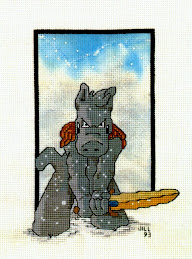The last of the H’s, boy they’ve taken me a while to get through!
My enjoyment of C.J Cutcliffe Hyne’s classic The Lost Continent may have been spoiled by my own preconceptions of it. Due to the similarity of the titles I got it confused with Conan Doyle’s The Lost World. I haven’t read The Lost World, but I did see and enjoy the 2001 TV movie. The way the book started also wrong footed me into believing it was going to be more about a search for Atlantis, rather than what it actually is.
The book was originally published in 1900 and had some success due to the interest in Victorian society about the legend of Atlantis. Like many books of its kind it begins with a couple of adventurers; one an archaeologist, finding evidence of some lost civilisation on a mountain in the Canary Islands. The narrator is sent the story as translated by the archaeologist that they discovered.
The documents they found were an account of the destruction of Atlantis (the lost continent of the title) written by a scholar, priest and warrior by the name of Deucalion.
I was probably a bit grumpy with the book, because once it got into Deucalion’s story I realised it wasn’t what I had been expecting, and it also failed to hold my interest. I suspect this is also partly because the book was written and published in the late 19th/early 20thcentury, and I’ve read and seen works since that have improved upon what Cutcliffe Hyne did here. I find that to be a bit of an issue with the older works on the list. They often do seem to have been improved upon, and don’t always stack up well against what has come since the original kicked off the ideas.
It’s a fairly tedious description of an Egyptian and Greek influenced society, and there’s also some nonsense about Deucalion having ruled over a kingdom in Yucatan (I guess that’s an attempt to explain the presence of the ziggurats and Egyptian influenced architecture and customs in Central and South America), they later mention the ‘tin islands’, which is how Deucalion escapes the destruction, I assume this is the Canary Islands, as that’s where the translator found the account.
It’s rather hard to warm to any of the characters, they all have significant flaws and Deucalion comes across as a fairly unsympathetic protagonist. He’s arrogant and chauvinistic, he’s also narrow minded and intolerant. He makes a really boring narrator, too. Everything comes across very dryly and fails to inspire any real feelings for him or the characters. By the end I was actually rather glad Atlantis sank into the sea.
Unfortunately The Lost Continent didn’t do it for me. For other tales of lost worlds or civilisations you could try Conan Doyle’s The Lost World, Jules Verne’s Journey to the Centre of the Earth or The Mysterious Island. There’s a lost civilisation in H. Rider Haggard’s She and the work that reminded me most of The Lost Continent, although I enjoyed it far more, was Wilbur Smith’s The Sunbird which is set both now, following an archaeologist uncovering a lost Carthaginian civilisation, and then with the story of the civilisations head priest mirroring that of the archaeologist.



No comments:
Post a Comment